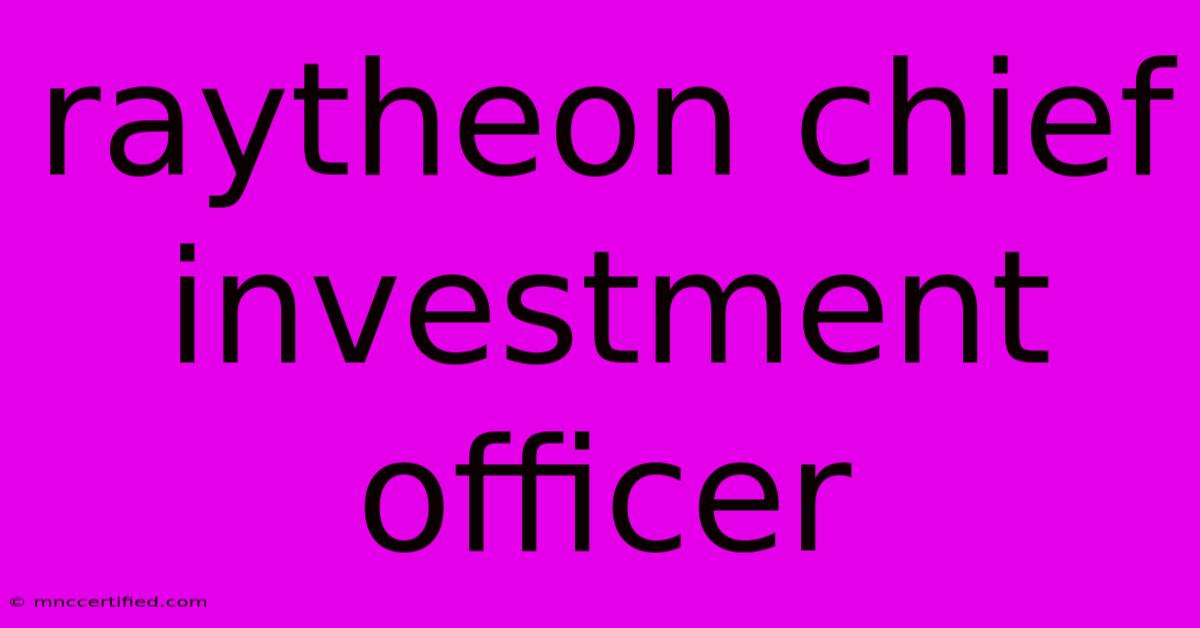Raytheon Chief Investment Officer

Table of Contents
Decoding Raytheon's Investment Strategy: A Look at the Chief Investment Officer's Role
Raytheon Technologies (RTX), a global aerospace and defense technology giant, requires a sophisticated investment strategy to navigate the complexities of its industry. Understanding the role of Raytheon's Chief Investment Officer (CIO) is key to grasping the company's financial health and future trajectory. While the specific name of the individual holding this crucial position may change, the responsibilities remain consistently critical. This article delves into the likely duties and the overall significance of the CIO role within Raytheon's intricate financial landscape.
The Crucial Role of Raytheon's Chief Investment Officer
The CIO at Raytheon Technologies isn't just managing a portfolio; they are a strategic partner, directly influencing the company's long-term growth and stability. Their responsibilities likely encompass a broad range of activities, including:
1. Strategic Asset Allocation:
This is arguably the CIO's most significant function. They are responsible for determining how Raytheon's vast assets are allocated across various investment vehicles. This includes:
- Equity Investments: Investing in publicly traded companies, potentially within the aerospace, defense, or technology sectors, to diversify holdings and potentially generate returns.
- Fixed Income Securities: Managing bonds and other fixed-income instruments to balance risk and provide stability to the overall investment portfolio.
- Alternative Investments: Exploring opportunities in private equity, real estate, or other alternative asset classes to enhance returns and potentially mitigate risks associated with traditional investments.
The CIO must constantly analyze market trends, regulatory changes, and geopolitical factors to make informed decisions about asset allocation, aiming for optimal risk-adjusted returns.
2. Risk Management and Mitigation:
Given the significant financial resources under their management, the CIO plays a vital role in risk management. This involves:
- Diversification: Spreading investments across different asset classes to minimize the impact of potential losses in any single sector.
- Hedging Strategies: Implementing strategies to protect against adverse market movements and unforeseen events.
- Compliance and Regulatory Adherence: Ensuring all investment activities adhere to relevant regulations and internal compliance policies.
Effective risk management is crucial for safeguarding Raytheon's financial stability and protecting shareholder value.
3. Performance Measurement and Reporting:
The CIO is responsible for meticulously tracking investment performance and providing regular reports to senior management and the board of directors. This includes:
- Key Performance Indicators (KPIs): Monitoring relevant KPIs such as return on investment (ROI), Sharpe ratio, and other metrics to assess the effectiveness of the investment strategy.
- Transparent Reporting: Providing clear and concise reports on investment performance, risk exposures, and any significant changes in market conditions.
- Performance Attribution: Analyzing the factors contributing to both positive and negative investment returns to inform future strategies.
Accurate and timely reporting is essential for informed decision-making within Raytheon.
4. Technology and Innovation:
In today's dynamic investment landscape, leveraging technology is paramount. The Raytheon CIO likely oversees:
- Investment Technology Platforms: Utilizing advanced technologies for portfolio management, risk assessment, and performance analysis.
- Data Analytics: Employing data analytics to identify investment opportunities and optimize portfolio construction.
- Algorithmic Trading: Potentially incorporating algorithmic trading strategies to improve execution speed and efficiency.
The Impact on Raytheon's Future
The CIO's decisions directly impact Raytheon's ability to fund research and development, acquire other companies, and ultimately, deliver returns to its shareholders. A successful investment strategy is crucial for the company's long-term growth and competitiveness in the ever-evolving aerospace and defense industry. Understanding the strategic role of this position allows for a more comprehensive understanding of Raytheon's overall financial health and future prospects.
Keywords: Raytheon Technologies, Chief Investment Officer, CIO, Investment Strategy, Asset Allocation, Risk Management, Portfolio Management, Aerospace and Defense, Financial Performance, Investment Returns, Raytheon Stock, RTX, Financial Planning.

Thank you for visiting our website wich cover about Raytheon Chief Investment Officer. We hope the information provided has been useful to you. Feel free to contact us if you have any questions or need further assistance. See you next time and dont miss to bookmark.
Featured Posts
-
Tiaa Cref Vs Fidelity Investments
Nov 20, 2024
-
State Bar Of Texas Life Insurance
Nov 20, 2024
-
Boutique Investment Banks Chicago
Nov 20, 2024
-
Travel Insurance For Eu Residents
Nov 20, 2024
-
Entrata Greystar Investment Group
Nov 20, 2024